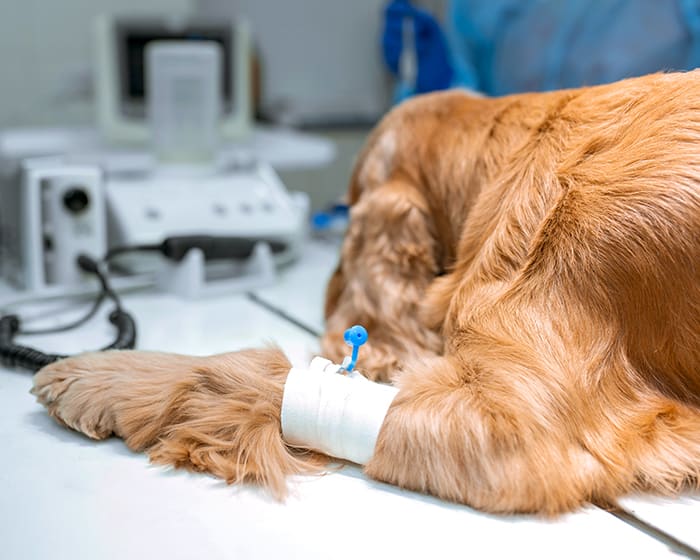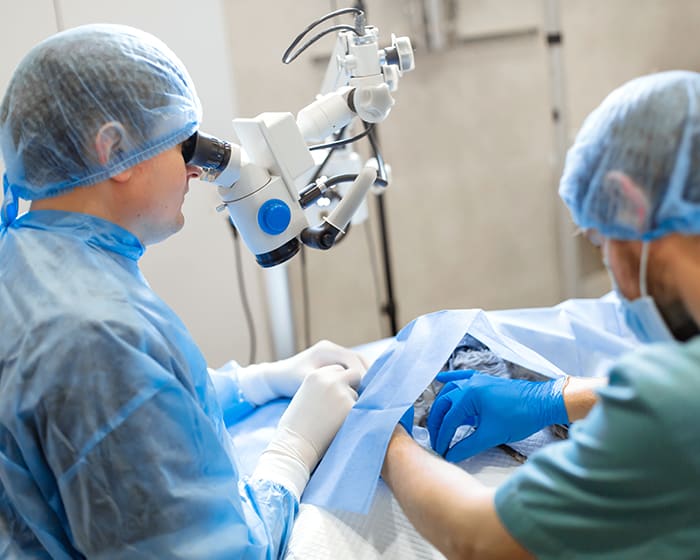Veterinary Surgery
At Veterinary Specialty Center of Tucson, our board-certified veterinary surgeons perform advanced surgery while putting your pet’s safety and comfort at the forefront.

Veterinary Surgical Services
From emergency care to a range of specialty services, our team of Tucson vets are here to provide comprehensive care year-round. We offer a greater variety of board-certified specialty veterinarians compared to any other specialty hospital in southern Arizona.
Veterinary surgeries are performed using the most advanced technology available, with a fully trained support staff available to our surgical patients.
Based on your pet's issues, our surgical specialists will complete a detailed physical exam and discuss recommended diagnostic tests, procedures, risk and expected outcomes with you.
What is a Board-Certified Veterinary Surgeon?
A veterinary surgeon has undergone four years of additional training after veterinary school to become a certified specialist. This training includes a one-year internship in small animal medicine and surgery, followed by a three-year residency program that involves surgical training. After successfully passing a three-day examination given by the American College of Veterinary Surgeons (ACVS), the candidate becomes a Diplomate of the ACVS.
What to Expect with Veterinary Surgery
At Veterinary Specialty Center of Tucson, our surgical facilities are equipped with cutting-edge surgical instruments and equipment. Everything we do, every decision we make, is designed to ensure post-operative success for your pet.
- Surgical Facilities & Equipment
Our state-of-the-art facilities include:
- Four surgical suites with viewing windows
- Separate dental and oral surgical suite
- Two digital radiology suites
- Ultrasound suites
- A dedicated room for our in-house helical CT scanner
- Large central ICU with in-house laboratory, oxygen cages, and a respiratory ventilator for pets
- Dedicated patient ward exclusively for cats, small dogs, and large runs for large dogs
- Isolation ward for pets that need to be quarantined with contagious illnesses
- Anesthesia & Pain Management
Each patient will have an anesthetic plan tailored to his or her specific condition. Overall cardiovascular health and lab work are considered with each pet.
By using a multimodal approach (e.g. local anesthetic, systemic medications and epidural anesthesia), we ensure your pet does not experience any pain during and after surgery.
- Continuous Patient Monitoring
Our state-of-the-art monitoring equipment (arterial line, pulse oximetry, blood pressure, tidal CO2, EKG, oscillometric blood pressure, etc.) allows us to monitor your pet's vital signs during surgery.
- Sterilization Techniques
We use a strict sterile technique during all of our procedures. This means our operative suite has positive pressure air flow and the room is cleaned after each procedure.
Our veterinary surgeons also use full surgical attire (surgical cap, surgical gloves and surgical gown) and sterile preparation methods.
- Surgical Lasers
In laser surgery, a veterinary surgeon uses a highly focused laser beam to efficiently vaporize living tissue with extreme precision, while sealing small blood vessels, lymphatics, nerve endings and capillaries.
Surgical lasers offer significant benefits to patients, including reduce pain and swelling, reduced bleeding and faster recovery.
- Post-Operative Care
Once your pet's surgery is complete, your veterinarian will be in touch with you to discuss the procedure and plan for post-operative care.
Some pets are able to return home the next day, while others will need to stay longer. Ultimately, the duration of their stay will depend on the complexity of the procedure and your pet's health status.
When you arrive to pick up your pet, we will provide you with discharge instructions and address any questions or concerns you may have.

